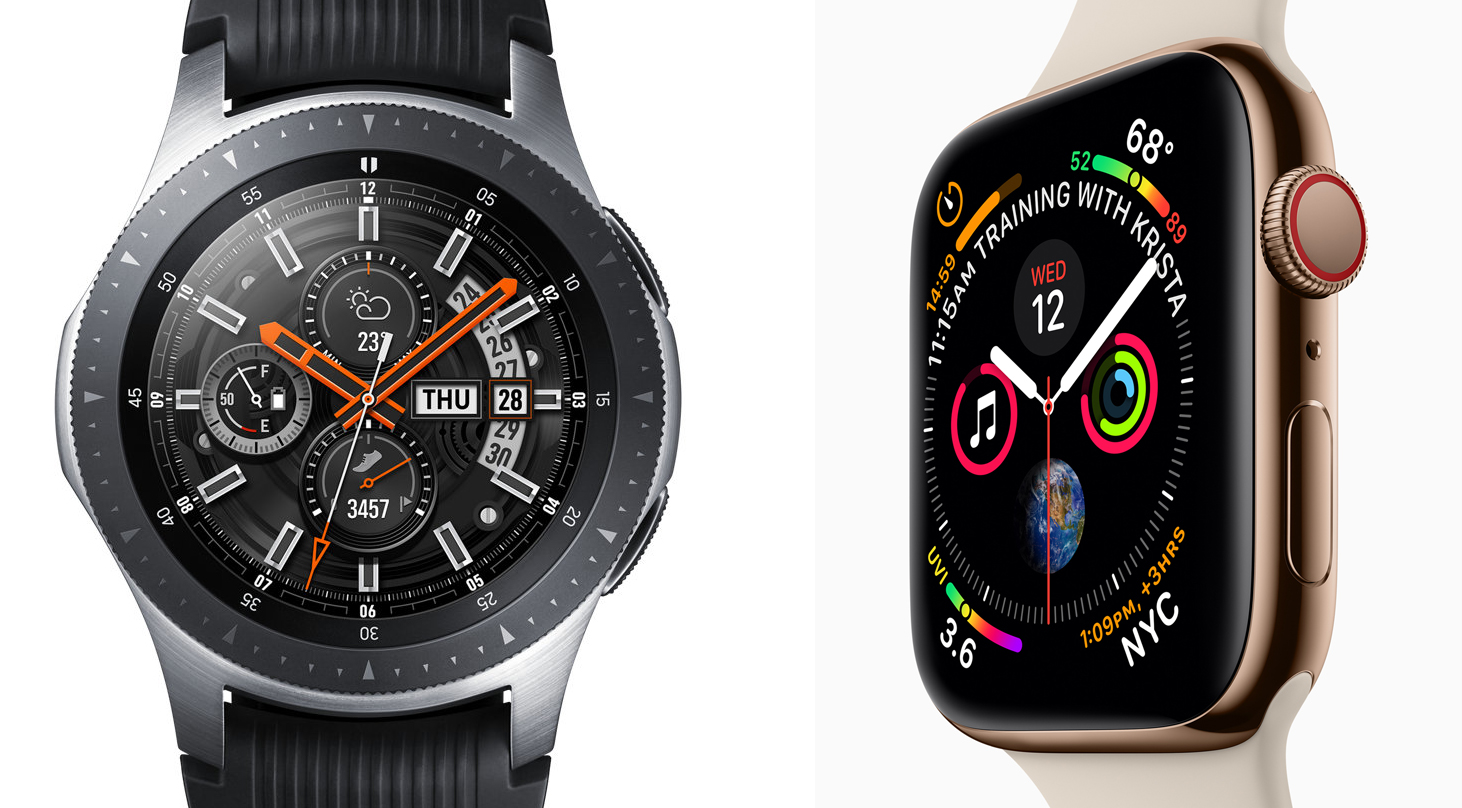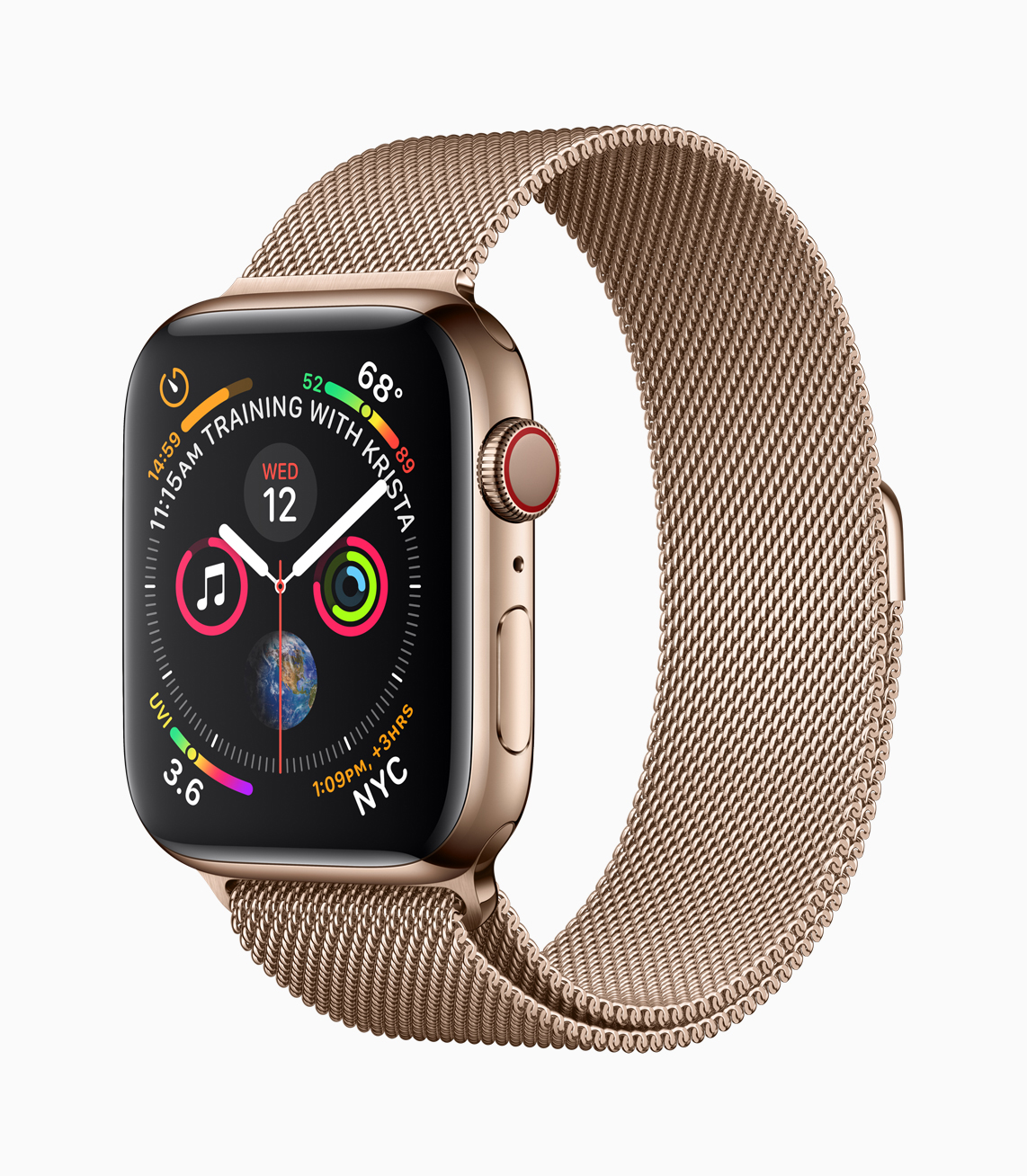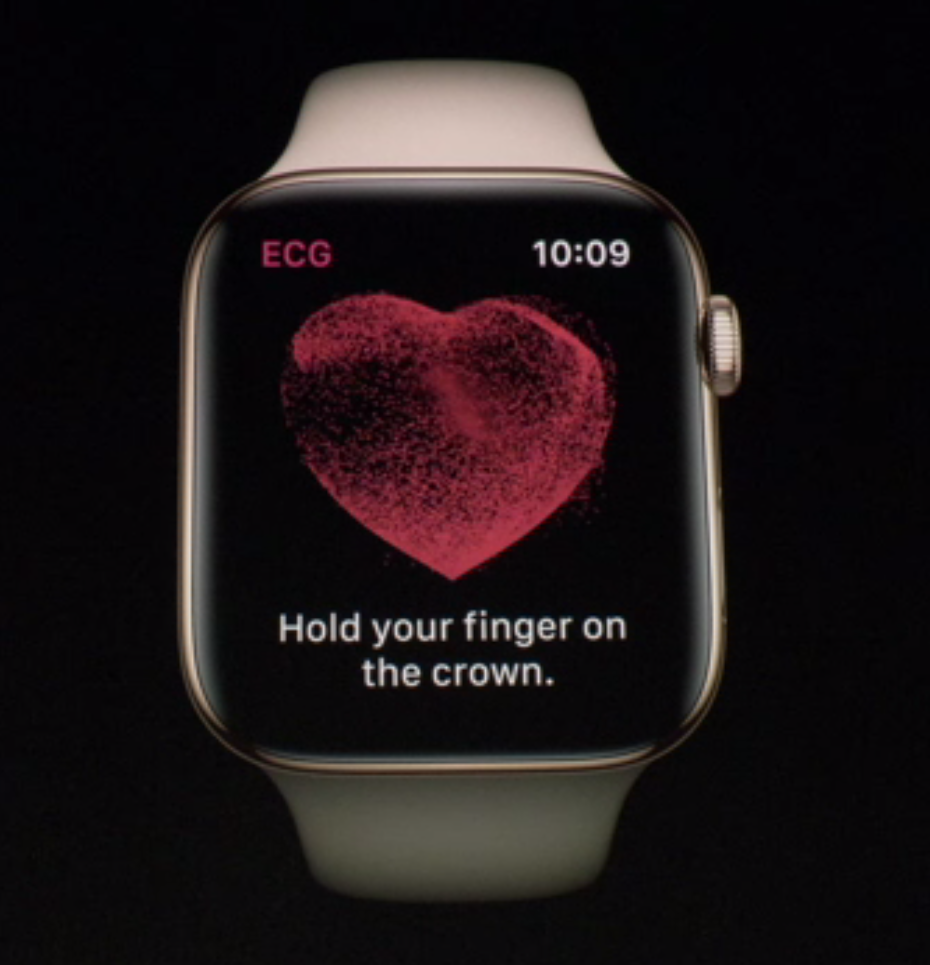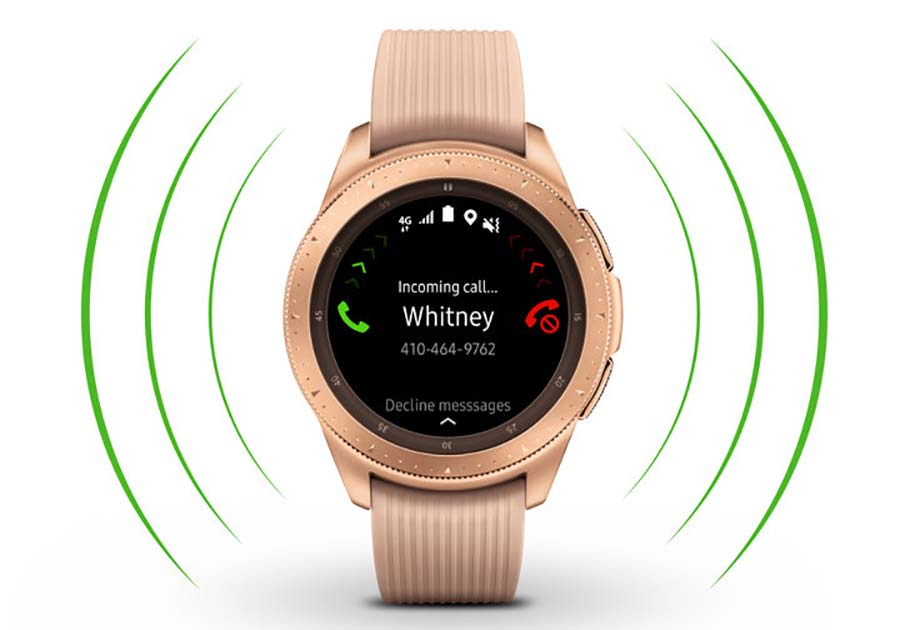Apple Watch vs. Samsung Galaxy Watch: Which Smartwatch Is Best?
Samsung is trying to make a splash with the Galaxy Watch but faces stiff competition from the Apple Watch.

Apple just announced its newest smartwatch, the Apple Watch Series 4. Currently the leader in wearables, Apple looks to further solidify its position with new features such as a larger display, a built-in electrocardiogram, and fall detection.
But Samsung too has a new smartwatch, the Tizen OS-based Galaxy Watch, which has such advancements as a four-day battery life and built-in LTE. For those reasons and others, we named it the best smartwatch for Android users.
Read on for the full breakdown of which smartwatch is worth your money, and stay tuned for our hands-on with the Apple Watch Series 4.
Editor's note, March 7:Samsung just released the $200 Galaxy Watch Active, a sleeker, sportier version of the Galaxy Watch that emphasizes health and fitness. It's our favorite smartwatch for Android users.
Galaxy Watch vs. Apple Watch: Specs compared
| Row 0 - Cell 0 | Samsung Galaxy Watch | Apple Watch Series 4 GPS |
| Price | $330-$350 | $399-$499 |
| Battery Life | 4 days | 18 hours |
| Size | 42mm, 46mm | 40mm, 42mm |
| Display Size | Circular Super AMOLED (360 x 360) | Square OLED Retina |
| Colors | Midnight Black, Rose Gold (42mm); Silver (46mm) | Silver, Gold, Space Gray (both sizes), stainless |
| OS | Tizen OS 4.0 | watchOS 5 |
| Music Storage? | Yes, with offline Spotify playlist support | Yes, with offline Apple Music playlist support |
| Water Resistance? | Swim-proof | Swim-proof |
| GPS? | Yes | Yes |
| Heart Rate Monitor | Yes | Yes |
| Mobile Payments | Samsung Pay | Apple Pay |
| LTE? | LTE connectivity available in a more expensive version ($380-$400) | LTE connectivity available in the LTE Series 4, which is $499 |
| Other Fitness Features | Heart rate-based stress-management tool | Guided breathing exercises, Apple Heart Study, ECG |
Price
The Apple Watch Series 4 will command a premium over its older models. The Series 4 will start at $399, while the LTE version will start at $499. However, Apple is dropping the starting price of the Series 3 to $279, a decrease of $50.
Samsung kept the price of the Galaxy Watch pretty much in line with previous versions. The 42mm Bluetooth model is $330, and the 46mm version is $350. The 42mm LTE Galaxy Watch costs $379, and the 46mm model will cost $399, at least through T-Mobile, which is the first carrier to have announced pricing. The watch will also be available on Sprint, Verizon and AT&T.
Advantage: Samsung
Design
Samsung and Apple have taken drastically different approaches to smartwatch design, with Samsung favoring the classic circular style of a traditional timepiece and Apple fully leaning into the smartphone-on-your-wrist aesthetic. However, the Series 4’s display takes up more of the face—about 30 percent larger than before—so there’s less of a bezel.
Sign up to get the BEST of Tom's Guide direct to your inbox.
Get instant access to breaking news, the hottest reviews, great deals and helpful tips.
Apple is offering the Series 4 in two sizes, 40mm and 44mm (it will still offer the Series 3 in a 38mm and 42mm size.) The smallest Galaxy Watch is 42mm, though because it's a round device, it doesn't feel much larger than the Apple Watch. The largest Galaxy Watch is a sizeable 46mm.

Samsung’s watch comes in three colors, though it restricts the 46mm to silver, with black and rose gold available only in the 42mm version. Like the Series 3, the Series 4 will come in silver, space gray and gold, but Apple will also offer three stainless steel finishes: polished, space black, and gold stainless.
For navigation, both watches use buttons to complement their touch screens. The Apple Watch has a Digital Crown, which you press to view your app screen and turn to scroll down a page. It’s been updated with haptic feedback, which should make scrolling through lists more precise. A side button beneath it calls up your dock of most-used apps.
The Galaxy Watch sports a rotating bezel for scrolling, a unique design decision carried over from past generations of Samsung smartwatches. A button on the top right of the watch case is a back key, and beneath it is a home key for returning to the main screen.

MORE: 10 Most Surprising Uses for Fitness Trackers
For those who prefer their smartwatches to look more like watches, the Galaxy Watch is the hands-down winner. But clearly the Apple Watch's looks haven't deterred its sales; people don't seem to mind that the watch is a slightly rounded square.
Advantage: Samsung
Fitness
Apple has led health and fitness sensor tech in smartwatches, and the Series 4 has a few new features that set it apart even further.
The watch can already alert you when your heart rate has spiked outside of a workout. That's why you read so many stories about people whose Apple Watches have saved their lives and none about Samsung's watches doing that. Now, the Series 4 can also let you know if your heart rate is too low, too.
More precise accelerometers in the Series 4 can detect if you’ve fallen, and the watch can even start an emergency call automatically if you don’t more for more than a minute after taking a spill.

Another advanced sensor in the Series 4 is an FDA-approved electrocardiogram; by holding your finger to the digital crown, the watch can measure your heart rhythm, and let you know if it detects atrial fibrillation.
The Galaxy Watch offers health features from past Samsung smartwatches, including a stress-management feature that detects when your heart rate is high and guides you through breathing exercises to bring that rate down. Fitbit has a similar feature, called Relax, and the Apple Watch has a related tool called Breathe.
The Galaxy Watch also automatically tracks six types of workouts, and it measures heart rate data even when you haven't launched a workout mode. This watch is also swim-proof and packs in GPS and GLONASS for more-accurate tracking of runs and bike rides.
MORE: Best Running Apps for iOS and Android
The Apple Watch offers all of those features, plus the aforementioned heart-rate alerts and motivational features. These include activity-sharing and badges that you'll get when you achieve a new goal or hit a new streak of consecutive workouts.
Samsung is trying to catch up to Apple, but it looks like the Apple Watch is still setting the bar for health-tracking smartwatches.
Advantage: Apple
Battery Life
In our tests, we were able get four days of battery life out of the Samsung Galaxy Watch—which was in line with what the company claims. (It’s also unclear how cellular connectivity will affect battery life.
Apple claims the slimmer design of the Series 4 won’t affect its battery life, which is good considering the LTE Apple Watch Series 3 struggled to stay alive through a full 8-hour workday without a phone nearby. The Bluetooth model coasted through 18 hours, sometimes longer without heavy usage.

Advantage: Samsung
Smartphone Compatibility
The Galaxy Watch works with both iOS and Android phones, though owners of Samsung's Galaxy phones will get far more out of Galaxy Watches thanks to the watches' tighter integration with the Samsung and Android ecosystem.
The Apple Watch works only with iPhones, so Samsung wins on cross-platform compatibility, but just barely.

Advantage: Samsung
Apps
Samsung has stuck with the Tizen operating system for its smartwatch lineup rather than defaulting to Wear OS. And that might be to the company's advantage in many respects, such as performance and integration with Galaxy smartphones. But Samsung has struggled to gain app support for its watches, and many popular apps were missing from the platform.
It seems like Samsung has won over apps like Strava, which was noticeably missing when we reviewed Samsung's Gear Sport last year but has prime placement on the Galaxy Watch website. It remains to be seen if the Galaxy Watch can attract as many high-quality apps as the Apple Watch has. Samsung says its smartwatch has more than 10,000 apps, but the company includes watch faces in that count. Apple's watchOS App Store also has more than 10,000 apps, but those are actually apps.
Advantage: Apple
Bottom Line
Until we get a chance to test out the next generation of Wear OS watches, Samsung’s Galaxy Watch remains our favorite for Android users. However, for iPhone users, the Apple Watch remains the obvious choice, given that device's tight integration with the iPhone. Even if you don’t want to pay for the premium features of the Series 4, the Series 3’s lower price makes the Apple Watch all the more compelling. We just wish its battery life were longer.
Credit: Tom's Guide
Caitlin is a Senior editor for Gizmodo. She has also worked on Tom's Guide, Macworld, PCWorld and the Las Vegas Review-Journal. When she's not testing out the latest devices, you can find her running around the streets of Los Angeles, putting in morning miles or searching for the best tacos.
-
alsano Hi,Reply
Great article. You mentioned in the chart that the Galaxy watch has LTE available "in a more expansive version". Does this mean the watch is capable of doing more things without a phone? I would love to know what the LTE capabilities are of both devices. -
chinojuice Per the Samsung website, GW LTE makes it into a standalone phone and messenger with ability to stream spotify's offline downloads from your phone to the watch and connecting with wireless earbuds.Reply -
bucekr I'm a huge Android fan but I can't stand that most of these are still coming in at round form factors. The most useless unpractical application for the intended use of the device. Apple got that right. Common ppl, it's a computer, not a watch.Reply
